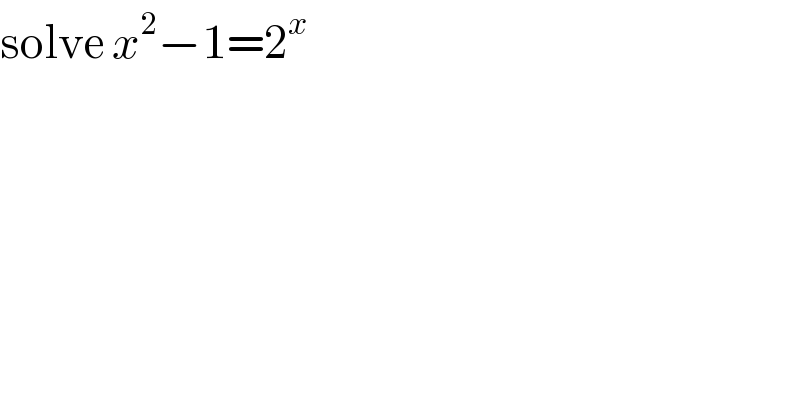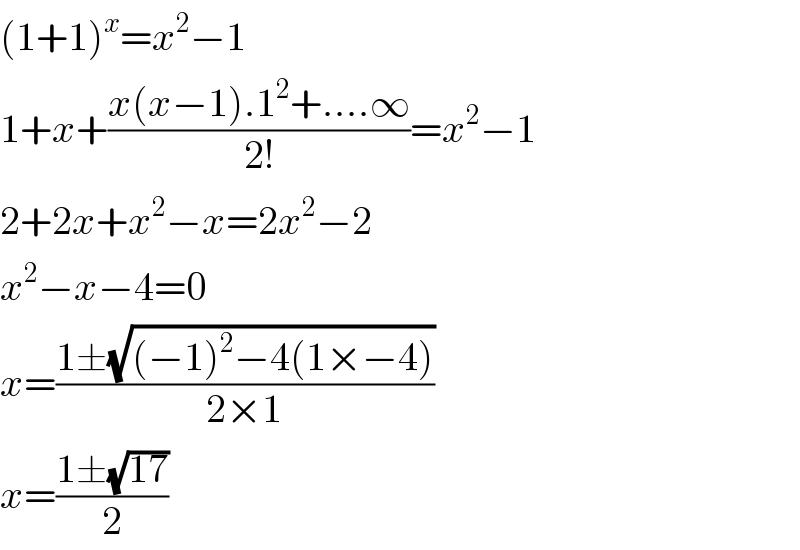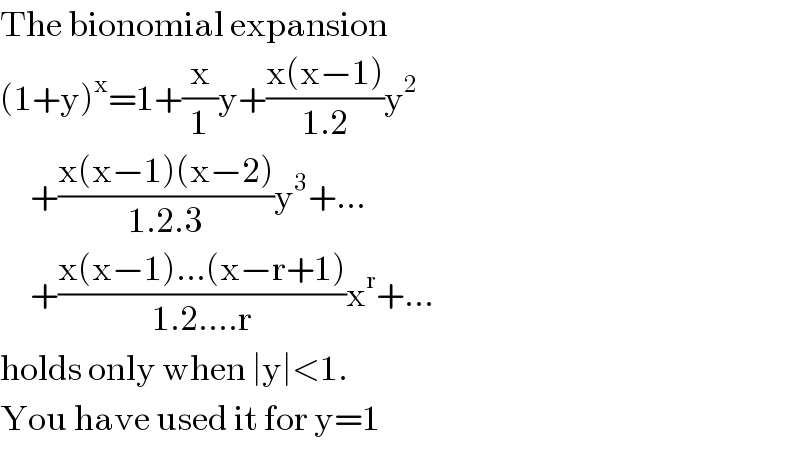
Question Number 26320 by byaw last updated on 24/Dec/17

$$\mathrm{solve}\:{x}^{\mathrm{2}} −\mathrm{1}=\mathrm{2}^{{x}} \\ $$
Commented by mrW1 last updated on 24/Dec/17

$${one}\:{solution}\:{is}\:{x}=\mathrm{3}. \\ $$
Commented by jota@ last updated on 24/Dec/17

$${by}\:{graphing}\:{other}\:{solution}\:{is} \\ $$$${x}\approx−\mathrm{1}.\mathrm{2} \\ $$
Commented by mrW1 last updated on 25/Dec/17

$${there}\:{are}\:{totally}\:{three}\:{solutions}: \\ $$$$\approx−\mathrm{1}.\mathrm{19825} \\ $$$$=\mathrm{3} \\ $$$$\approx\mathrm{3}.\mathrm{40745} \\ $$
Answered by ibraheem160 last updated on 24/Dec/17

$$\frac{\mathrm{1}\pm\sqrt{\mathrm{17}}}{\mathrm{2}} \\ $$
Commented by mrW1 last updated on 24/Dec/17

$${they}\:{don}'{t}\:{satisfy}\:{the}\:{equation}. \\ $$
Answered by ibraheem160 last updated on 24/Dec/17

$$\left(\mathrm{1}+\mathrm{1}\right)^{{x}} ={x}^{\mathrm{2}} −\mathrm{1} \\ $$$$\mathrm{1}+{x}+\frac{{x}\left({x}−\mathrm{1}\right).\mathrm{1}^{\mathrm{2}} +....\infty}{\mathrm{2}!}={x}^{\mathrm{2}} −\mathrm{1} \\ $$$$\mathrm{2}+\mathrm{2}{x}+{x}^{\mathrm{2}} −{x}=\mathrm{2}{x}^{\mathrm{2}} −\mathrm{2} \\ $$$${x}^{\mathrm{2}} −{x}−\mathrm{4}=\mathrm{0} \\ $$$${x}=\frac{\mathrm{1}\pm\sqrt{\left(−\mathrm{1}\right)^{\mathrm{2}} −\mathrm{4}\left(\mathrm{1}×−\mathrm{4}\right)}}{\mathrm{2}×\mathrm{1}} \\ $$$${x}=\frac{\mathrm{1}\pm\sqrt{\mathrm{17}}}{\mathrm{2}} \\ $$
Commented by Rasheed.Sindhi last updated on 26/Dec/17

$$\mathrm{The}\:\mathrm{bionomial}\:\mathrm{expansion} \\ $$$$\left(\mathrm{1}+\mathrm{y}\right)^{\mathrm{x}} =\mathrm{1}+\frac{\mathrm{x}}{\mathrm{1}}\mathrm{y}+\frac{\mathrm{x}\left(\mathrm{x}−\mathrm{1}\right)}{\mathrm{1}.\mathrm{2}}\mathrm{y}^{\mathrm{2}} \\ $$$$\:\:\:\:\:+\frac{\mathrm{x}\left(\mathrm{x}−\mathrm{1}\right)\left(\mathrm{x}−\mathrm{2}\right)}{\mathrm{1}.\mathrm{2}.\mathrm{3}}\mathrm{y}^{\mathrm{3}} +... \\ $$$$\:\:\:\:\:+\frac{\mathrm{x}\left(\mathrm{x}−\mathrm{1}\right)...\left(\mathrm{x}−\mathrm{r}+\mathrm{1}\right)}{\mathrm{1}.\mathrm{2}....\mathrm{r}}\mathrm{x}^{\mathrm{r}} +... \\ $$$$\mathrm{holds}\:\mathrm{only}\:\mathrm{when}\:\mid\mathrm{y}\mid<\mathrm{1}. \\ $$$$\mathrm{You}\:\mathrm{have}\:\mathrm{used}\:\mathrm{it}\:\mathrm{for}\:\mathrm{y}=\mathrm{1} \\ $$
